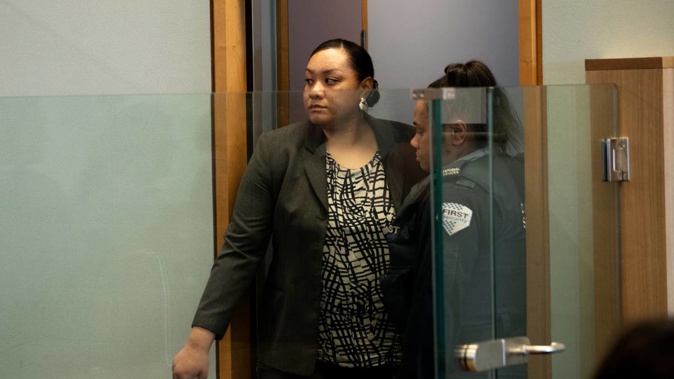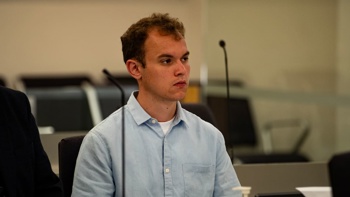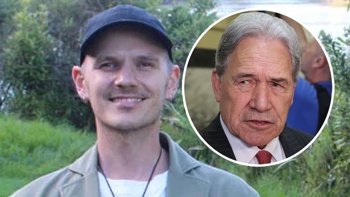
Warning: Graphic content
A 501 deportee has failed to convince a jury the 94 stab wounds she inflicted on a neighbour in a South Auckland highrise - in a violent confrontation eerily similar to one that got her expelled from Australia - was a matter of self-defence.
Susana Makerita Leota-Lu, 37, was found guilty of murder today in the High Court at Auckland after about two and a half hours of jury deliberations.
The defendant stared ahead, with no visible reaction, as members of victim Samantha Whitehouse’s family sat in the courtroom gallery behind her, hugging each other through anguished tears. Justice Jane Anderson has set a sentencing date for December.
Police arrived at a disturbing, bloody scene at Manukau’s Lakewood Plaza building on the morning of September 3 last year after a frantic 111 call by Leota-Lu’s other neighbours, who could hear screaming and cries for help coming from her seventh-floor apartment around 4am.
Leota-Lu initially tried to turn police away, but they were persistent.
“I won’t lie to you,” she admitted as officers entered. “There’s a body in there.”
Police found two knives on the defendant and two other knives still in Whitehouse’s body. There was blood in various parts of the apartment, which prosecutors would later argue was a sign it had been a prolonged torture. It appeared a “broken and bloodied” fold-up camping chair had been used to beat the victim, who had bruising all over her body, and screwdrivers on the floor might have been used as stabbing weapons as well.
Of the victim’s 94 wounds, 26 to her hands were later assessed by a medical examiner to have been defensive. She also suffered 15 wounds to her face, eyes and nose; five to her neck, including a long slit; and 27 injuries to her chest. Some of the wounds, the medical examiner testified, appeared to have been inflicted after Whitehouse’s death.
Leota-Lu had one cut to her finger and another on her arm. She initially told emergency responders she had cut herself but later that morning, as a befuddled self-defence claim started to emerge, she said Whitehouse had given her the injuries.
“Ms Leota-Lu walked out of that room virtually unscathed and told anyone who would listen Ms Whitehouse deserved it,” Crown prosecutor Anna Devathasan told jurors yesterday during her closing address. “This wasn’t self-defence. This was murder.”
The two knew each other in passing as neighbours but that night was only the third time they’d spent time together. After a random meeting in the elevator, they met with a third person and smoked methamphetamine together before returning to Leota-Lu’s apartment. After the third person left, an argument seems to have reignited in which Leota-Lu accused Whitehouse of stealing her phone, sleeping with her ex-husband and somehow being responsible for her brother’s death.
Susana Leota-Lu appears in the High Court at Auckland, accused of the September 2022 murder of neighbour Samantha Whitehouse. Leota-Lu admitted she inflicted the dozens of stab wounds but said it was self-defence. Photo / Dean Purcell
“While [the stabbing attack] was happening, Ms Leota-Lu was listing her grievances,” Devathasan said, referring to testimony from a neighbour who heard a woman yelling, “That’s my family,” or “That’s my phone.”
When the other neighbour knocked on Leota-Lu’s door, fearful she was being sexually assaulted, the defendant appeared at the door panting and out of breath. Speaking in Samoan, she told the witness not to call police - explaining that she was with her ex’s girlfriend, who had stolen from her.
From behind the door, the witness could hear another female voice calling out for help.
The witness went back to her apartment and called 111, hearing a final high-pitched scream and then silence. Prosecutors Devathasan and Jacinda Bragg theorised that Leota-Lu must have gone back to Whitehouse after the interruption and continued the stabbing spree.
When police arrived, she continued to show anger toward the victim, calling her a “bitch” and “c***”, witnesses said during the trial.
Later that morning, the defendant gave a recorded police interview that was also played for jurors.
Defence lawyers Kim Holden and Shane Cassidy noted their client had been suffering “delusional thoughts” in her initial interactions with police and during her interview. They asked jurors to instead consider her testimony at trial earlier this week.
“There are a lot of thoughts she had that are not based in reality,” Holden said during her closing address, emphasising that it’s important in evaluating a self-defence claim that jurors try to view the circumstances as the defendant would have seen them.
During her testimony, Leota-Lu claimed Whitehouse, who was shorter and half her weight, was the initial aggressor with a knife. Leota-Lu said she was able to disarm Whitehouse but the other woman kept aggressively charging at her two other times, even when she no longer had a weapon.
“She was in fear of her life,” Holden argued. “[Whitehouse] might have been little, but she was strong.
“...She just kept stabbing at her to keep away. It’s like a frenzy. There’s no time to stop and think.”
/cloudfront-ap-southeast-2.images.arcpublishing.com/nzme/TAKE6CSTYHD3XLNXR2YBSXOP7M.jpg)
A police presence remained outside the Lakewood Plaza apartment complex on Lakewood Court, Manukau, on September 3, 2022, where a woman died. Photo / Tom Dillane
Prosecutors were dubious of Leota-Lu’s claim that the other woman ever had a knife or was the aggressor that night, describing the defence claim as “false window dressing” hastily added after she had already revealed her true intention and “completely unmoored from the truth”. But even if Whitehouse had been initially attacked, it’s hard to imagine a scenario in which 94 stab wounds could be considered self-defence against a person who had already been disarmed, they argued.
Devathasan noted there were only three times that Leota-Lu expressed being scared or nervous during her police interview immediately after the incident, and none of those references were in relation to Whitehouse. She was instead worried about police standing at the door, the prosecutor said.
Jurors were not told that Leota-Lu had been deported from Australia as a 501 after serving a prison sentence there, but they were told about the “real similarities” between Whitehouse’s homicide and a non-fatal attack Leota-Lu was convicted of carrying out on a flatmate when she lived in a suburb of Sydney.
In that 2018 attack, Leota-Lu armed herself with a knife without provocation and targeted a person she didn’t know that well, although in that case she attacked him with the handle rather than the blade, prosecutors noted. She dragged the victim back into the room when he tried to leave, and the incident only ended when the victim was able to overpower and disarm her, prosecutors said.
“Ms Leota-Lu had been accusing Ms Whitehouse of imaginary things all night,” Devathasan said as she listed the similarities to the Australia case. “Ms Whitehouse tried to leave [and] this made Ms Leota-Lu angry.
“Ms Leota-Lu, as she’d done in Australia, armed herself with a knife and stopped Ms Whitehouse from leaving. She attacked her with at least three knives in various places in the room. She also assaulted her with a camp chair...
“She stabbed her while she had her hands up to protect herself. [Leota-Lu] didn’t act to protect herself... She killed Ms Whitehiuse in a rage, and afterwards she tried to clean up.”
Two days, two 501 murder verdicts
Justice Anderson may have an opportunity to delve further into Leota-Lu’s criminal history at her sentencing hearing. During a previous sentencing hearing at Penrith Local Court in 2018 for the flatmate attack, it was noted that criminal history was “extensive”, according to coverage of the hearing by New South Wales-based newspaper the Western Weekender.
Her lawyer said at that hearing that Leota-Lu, who was also charged with attacking a fellow inmate, began to see her life “spiral out of control” in July 2017 after her husband was deported to New Zealand and she turned to drugs to cope. But she had since “refreshed her commitment to religion” and wanted to do missionary work after her release from prison, the lawyer was reported saying at the time.
The judge at that hearing sentenced her to 14 months’ imprisonment.
Under Section 501 of Australia’s Migration Act, which has controversially resulted in the expulsion of thousands of New Zealanders, those ordered to serve sentences of more than a year in prison are considered to have failed the “character test” and are eligible for deportation.
Today marked the second time in as many days that jurors in the High Court at Auckland found a 501 deportee guilty of murder.
It took jurors in another courtroom less than an hour last night to reject former Melbourne Hells Angels president Andrew Lamositele-Brown’s claim that the Boxing Day 2021 shooting death of Auckland gang prospect Petau Petau was an accident.
Although Lamisotele-Brown’s criminal record was relatively short, he had been targeted by immigration officials largely based on his position of power within the gang.
In both cases, jurors were made aware the defendants had previously lived in Australia but were not told that they had been deported.
Craig Kapitan is an Auckland-based journalist covering courts and justice. He joined the Herald in 2021 and has reported on courts since 2002 in three newsrooms in the US and New Zealand.
Take your Radio, Podcasts and Music with you

/cloudfront-ap-southeast-2.images.arcpublishing.com/nzme/5EVGHLLU45DRPOWKUC7UJAO4IE.JPG)








